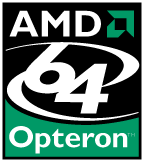Hell freezes over: Dell opts for AMD's Opteron
 In spite of all the stonewalling, when Dell's numbers fell last quarter, the handwriting was really on the wall. Dell could no longer be a sole-source Intel shop. The business market had voted with its pocketbook, and Dell lost. Dell's first quarter net income slipped 18%.
In spite of all the stonewalling, when Dell's numbers fell last quarter, the handwriting was really on the wall. Dell could no longer be a sole-source Intel shop. The business market had voted with its pocketbook, and Dell lost. Dell's first quarter net income slipped 18%.Note that this win is servers only. According to the article, Dell also said it would be building new servers using Intel's Woodcrest, which will be Intel's start of a long-awaited march back into competitive parity with AMD. I'm a decades-long fan of Intel. I've owned Intel stock since 1988 when I was given my first 12 shares. I've watched Intel stock split 6 times since then. Those 12 modest shares alone have grown to over 400 (not including other purchases over time).
In spite of my Intel stock investment I've purchased AMD hardware over Intel. I've built three home systems over the past four years using nothing but Athlon XP 32-bit chips. All the hardware was purchased from Newegg. I purchased AMD because I couldn't afford equivalent Intel technology. What I could afford I didn't want because of the poor performance relative to AMD at the same price points. I've never regretted those purchases and all those systems still work just fine.
Before the Athlon 64, AMD was the underdog. They priced their chips aggressively (inexpensively) relative to Intel. And the engineering in those 32-bit only chips were second to none, including Intel. But AMD was always seen as not-quite-good-enough when compared to Intel. Then AMD introduced the Athlon 64, and the rest as they say is history. AMD worked hard to get adopted early-on by Sun and HP, and slowly began to win over the business community with its Opteron-based servers. AMD took advantage of Intel's poor 64-bit offering, the Itanium. AMD adopted a page out of an earlier Intel playbook, where it built a seamless 32-bit to 64-bit adoption path in the exact same way Intel did for moving from 16- to 32-bits. With AMD chip technology it was far easier to future-proof your systems for 64-bit software while continuing to run your 32-bit applications without a performance penalty. That was definitely not the case with Itanium.
Relative to Itanium, the AMD64 systems were cheaper. But when you compared the AMD Athlon 64 price with Intel's desktop processors, a bad trend began to emerge. AMD was not less expensive, and when the X2's were released, they were a lot more expensive than Intel. Being the cheap bastard that I am, I haven't purchased any AMD64 chips because I can't justify the premium price. The only way the AMD prices began to drop was when Intel began to introduce Pentiums with 64-bit support and dual cores. And it was a slow drop, because Intel's initial offerings were either power hogs or just a couple of cores slapped together on the same slab of silicon, and weren't seen as a credible competitor.
So here we all are in the middle of 2006. Intel's shipping its Core Duo (which I have in my notebook and is very sweet). They're ready to ship their newest dual-core processors starting in July and August. AMD of course is not sitting still. It just shipped it's dual-core Turian. And I just read that AMD's stock price is up over 14% to about $35 because of Dell's announcement. Everything looks wonderful for AMD. Or does it?
AMD's position has certainly reversed with respect to Intel's. AMD now has the lauded technology. AMD is perceived to be better than Intel on a number of fronts, specifically performance and lower power consumption. AMD is charging a premium for all their 64-bit chips, especially their dual-core processors. AMD is taking advantage of their new-found fame and glory. And in the process they're taking advantage of me.
I'm looking forward to Intel's rise back to the top of the microprocessor roost. Intel has paid deservedly for its hubris, especially the sin of allowing marketing to drive clock speed. And make no mistake. Intel is coming back with a vengeance. Intel doesn't like to loose (no one does who's that competitive). Intel is six times larger than AMD, and Intel knows chip processing like no other (in spite of what IBM and Charter like to say). Intel's dual-core Pentiums have reached parity with AMD's X2 series and their server chips will meet or exceed AMD's Opterons. I'm looking forward to the end of 2006. That's when Intel will rise once again, technically and financially. My Intel stock value will rise again, and I'll be replacing AMD with Intel. And those Dell/AMD servers? Who knows? Perhaps they'll disappear like their AMD 286 progenitors did back in the early days of Dell. They won't be missed.

Comments
Post a Comment
All comments are checked. Comment SPAM will be blocked and deleted.